
PROCEDURE U/S 156(3) – DIRECTION TO REGISTER FIR
Posted on April 1, 2024
Under Section 156(3) of the Code of Criminal Procedure (CRPC) in India, any Magistrate empowered under Section 190 may order an investigation to be conducted by the police into a cognizable offense. Here’s the procedure:
- Filing of a Complaint: Any person can file a complaint before a Magistrate about the commission of a cognizable offense. The Magistrate must be satisfied that there are sufficient grounds for proceeding based on the complaint.
- Examination of Complainant: The Magistrate may examine the complainant and any witnesses present.
- Recording of Statement: The Magistrate must record the substance of the information received in writing and sign it as specified in Section 200 of the CRPC.
- Taking Cognizance: After recording the statement, if the Magistrate is satisfied that there are sufficient grounds for proceeding, they may take cognizance of the offense under Section 190 of the CRPC.
- Order for Investigation: If the Magistrate decides not to take cognizance immediately, but there are still grounds for suspicion, they may order an investigation under Section 156(3). This order can be made at any stage of the proceeding, even after cognizance has been taken.
- Direction to Police: The Magistrate may direct the officer in charge of the police station to investigate the matter and submit a report. The police must comply with this direction and investigate the case as if it were registered on their own initiative.
- Report by Police: Once the investigation is complete, the police must submit a report to the Magistrate. This report should contain the results of the investigation and the reasons for their conclusions.
- Further Proceedings: Based on the report submitted by the police, the Magistrate may take further action as per the provisions of the CRPC, such as issuing summons or warrants, or dropping the proceedings if no sufficient grounds are found.
It’s important to note that Section 156(3) empowers the Magistrate to direct an investigation by the police but does not confer any right upon the police to investigate without the order of the Magistrate.
Judgements relating to 156(3) of CRPC
There have been several significant judgments by Indian courts regarding Section 156(3) of the Code of Criminal Procedure (CRPC). Here are a few notable ones:
- Municipal Corporation of Delhi v. Purshotam Dass Jhunjunwala (AIR 1983 SC 147): In this case, the Supreme Court held that the power under Section 156(3) is an independent power and is not subject to the control of the police. The Magistrate can direct an investigation even if the police have refused to do so.
- Sakiri Vasu v. State of Uttar Pradesh (2008) 2 SCC 409): The Supreme Court reiterated that the power under Section 156(3) is a very wide power and is in no way limited by the provisions contained in Section 154 (FIR) or Section 156(1) (police power to investigate).
- Priyanka Srivastava & Anr vs State Of UP & Ors (2015) 6 SCC 287): The Supreme Court held that if a Magistrate does not find merit in a complaint filed before him but still finds a case for investigation, he is empowered to order an investigation under Section 156(3) even if he has not taken cognizance of the offense.
- Ramesh Kumari v. State (NCT of Delhi) (2006) 2 SCC 677): The Supreme Court held that the power under Section 156(3) is an extraordinary power and must be exercised sparingly and cautiously.
- Gian Singh v. State of Punjab (2012) 10 SCC 303): The Supreme Court held that the power under Section 156(3) can be exercised by the Magistrate even after cognizance has been taken and the case is pending before the court.
These judgments highlight the importance of the power under Section 156(3) and clarify its scope and limitations, ensuring that it is used judiciously to further the cause of justice.
Article Written by
Pathakota Venkata Mohana Rao B.Com, LL.M
Advocate at High Court of Andhra Pradesh and Telangana
Designated Partner at VENSO LAW OFFICES LLP
Office No: +91 967 967 6450
E-mail ID: vensolawofficesllp@gmail.com

